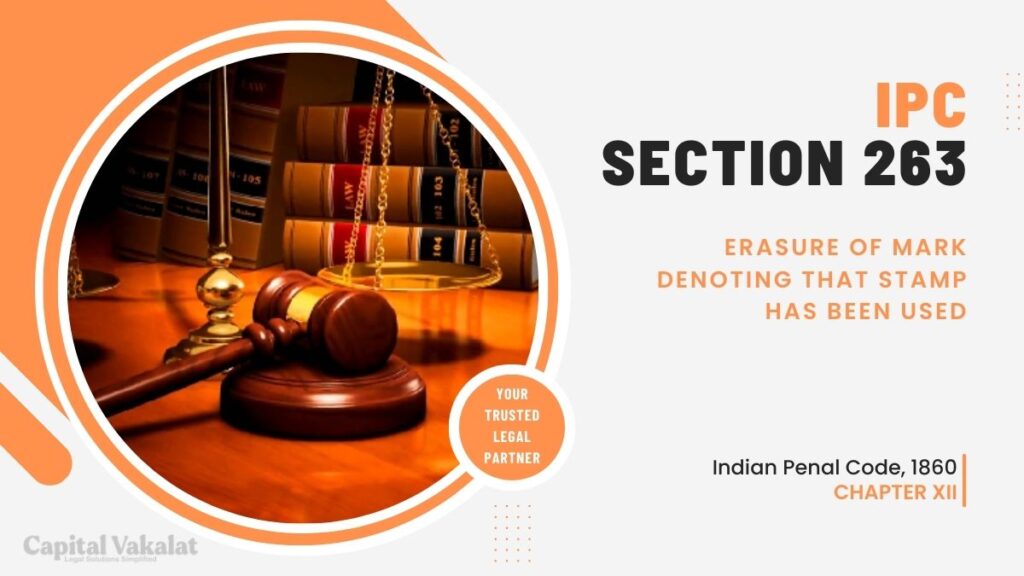In this comprehensive article, we will delve into the intricacies of Section 263 of the Indian Penal Code (IPC), which deals with the erasure of marks denoting that a stamp has been used. This particular legal provision holds significant relevance in the context of stamp duty and the consequences of tampering with stamps that have been used for various legal transactions.

Throughout this article, we will explore the essence of Section 263 IPC, its implications, and the legal consequences associated with its violation.
Introduction to Section 263 IPC
Stamp duty is a crucial aspect of legal and financial transactions in India. Stamps are affixed to various documents to signify their validity and compliance with legal requirements. However, there are instances where individuals attempt to manipulate these stamps, erasing the marks that denote their usage, which is a violation of Section 263 IPC. In this article, we will explore the concept of stamp duty, the relevance of Section 263 IPC, and the consequences of tampering with stamps.
Understanding the Significance of Stamps
Stamps are more than just pieces of paper. They serve as a legal indication that a particular document or transaction adheres to the relevant regulations and has been duly executed. The use of stamps is essential for making documents legally valid, and tampering with them undermines the integrity of the legal system.
Section 263 IPC: An Overview
Section 263 of the IPC is a critical provision that specifically addresses the erasure of marks denoting that a stamp has been used. It states that anyone who removes, or otherwise tampers with, any mark that indicates a stamp’s use shall be punished. This section is designed to deter individuals from attempting to manipulate stamped documents.
Erasure of Mark Denoting Stamp Usage
Erasing or altering the mark on a stamp can take various forms, such as physically removing the inked portion or using chemicals to dissolve the mark. In any case, such actions are considered illegal and can lead to severe legal consequences.
Legal Implications
Tampering with stamp marks violates the law, and those found guilty can face legal repercussions. Legal implications may include fines, imprisonment, or both. The severity of the punishment depends on the extent of tampering and the intent behind it.
Penalties for Violation
The penalties for violating Section 263 IPC can range from fines to imprisonment. The Indian legal system takes the integrity of stamp duty seriously, and offenders can expect strict consequences for their actions.
Recent Cases
To better understand the application of Section 263 IPC, it’s essential to look at recent cases where individuals have been penalized for erasing stamp marks. These cases serve as examples of how the legal system upholds the integrity of stamp duty.
Importance of Adhering to Section 263 IPC
Adhering to Section 263 IPC is crucial not only to maintain the legal sanctity of documents but also to ensure the smooth functioning of financial and legal transactions. It serves as a deterrent against fraudulent activities.
Conclusion
Section 263 IPC plays a pivotal role in upholding the integrity of stamp duty in India. Tampering with stamp marks is a serious offense with significant legal consequences. To maintain the legal sanctity of documents and ensure the smooth execution of transactions, it is imperative to adhere to this legal provision. Understanding the significance of stamps and the implications of Section 263 IPC is essential for individuals and organizations alike.
In conclusion, tampering with stamp marks is not only a violation of the law but also a breach of trust in legal and financial transactions. Adhering to Section 263 IPC is a fundamental requirement for a transparent and reliable legal system. If you have any more questions regarding this legal provision, please refer to our Frequently Asked Questions section.
Frequently Asked Questions
Are there any exceptions to Section 263 IPC?
Section 263 IPC applies to most cases, but there may be exceptions based on specific circumstances.
What is the typical punishment for violating Section 263 IPC?
The punishment may vary depending on the extent of tampering and the intent, but it often includes fines and imprisonment.
How can one report a violation of Section 263 IPC?
Violations can be reported to the local authorities or the police.
Is there a statute of limitations for prosecuting Section 263 IPC violations?
The statute of limitations may vary, but authorities can prosecute such violations even after some time has passed.